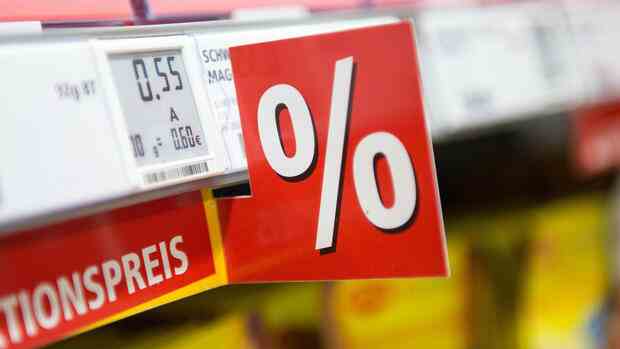It was the biggest excitement in the food trade in the past year: the dispute between grocers and their suppliers over purchase prices, which tore large gaps on the shelves. And the bad news first: This theater should go on like this.
The fatal thing is that both sides see themselves as victims and demand that the other side give in. And at first glance, both retailers and brand manufacturers have good arguments for their tough stance. That is why agreements have been reached in individual cases, but the fronts remain hardened.
It’s not just customers who have been looking for their favorite products like Coca-Cola or Mars bars for weeks in vain who suffer from this. Many pressing problems in the industry also remain unresolved.
Rewe boss Lionel Souque added significantly in interviews shortly before Christmas. Big brand manufacturers are just trying to increase their profit margins, he said, claiming they are demanding price increases that are unjustified. For the first quarter, Rewe in Germany already has price increases worth one billion euros on the table.
Top jobs of the day
Find the best jobs now and
be notified by email.
Christian Koehler, general manager of the brand association, had previously provoked the dealers again with an open letter. In it he had called for a return to solution-oriented talks, but at the same time passed the buck to the dealers. The accusation by parts of the trade that industry is the driver of inflation blatantly contradicts the facts, he wrote. And he accused the retailers of having raised the prices of their own brands even more.
Retailers can achieve little in climate protection alone
But the more public this dispute becomes, the more difficult it becomes to return to constructive negotiations. The fact that this repeatedly leads to empty shelves is the most harmless consequence. The joint fight against problems in the supply chain also falls by the wayside. But what weighs the most: With this dispute, retailers and manufacturers are torpedoing their own promises for climate protection. Because they can only be fulfilled in trusting cooperation. And many of those involved are further away from that than ever before.
Many retailers in particular have raised great expectations with their full-bodied commitment to more climate protection. They build photovoltaic systems in their supermarkets and buy green electricity. By the end of 2030, Rewe wants to reduce greenhouse gas emissions for its own brands by 15 percent compared to 2019. Edeka has announced that it will reduce the network’s greenhouse gas emissions by 33.6 percent by 2025 compared to 2017.
But if traders are honest with themselves and with the public, they would have to admit that they can’t do much on their own. According to independent experts, less than ten percent of retail emissions are likely to be caused by the retailers themselves. The vast majority of CO2 emissions occur in the upstream and downstream areas – for which retailers are also responsible, but over which they only have indirect influence.
And this is exactly where the manufacturers come into play. According to calculations by the Swiss trading cooperative Migros, 75 percent of all emissions along their value chain come from the actual product, i.e. essentially from production. If the dealers aim to protect the climate, it is not enough just to make their own operations climate-neutral.
>> Read also: Grocery retail outlook – An industry that has long been considered crisis-proof is coming under pressure
The trade has two options for this. One would be for retailers to use their purchasing power and dictate clear sustainability guidelines to manufacturers. But for this it would be necessary for the dealers to agree among themselves on such an approach, which would be illusory in view of the tough competition in the industry. In addition, the Federal Cartel Office would probably set limits to such a concerted action.
A destroyed environment does more harm than expensive food
The better alternative would be to develop a climate-friendly value chain in a trusting cooperation between manufacturers and retailers, with food that is produced in a much more sustainable way. This would require the costs incurred to be shared fairly between manufacturers, dealers and customers. Because only if everyone is willing to do their part can this great challenge be mastered.
The basic requirement for this is trust. But where is that supposed to come from when those involved publicly insult each other and create a poisoned atmosphere in which real progress in climate protection is becoming increasingly difficult?
If climate protection in retail is not to be just lip service, retailers and manufacturers must end their skirmishes and set new priorities. Reducing CO2 emissions is not possible on your own, but only at the negotiating table, with common standards and transparent goals.
After all, everyone must be clear: A destroyed environment also harms customers more in the long term than expensive food. And consumers would be more willing to accept higher prices if they were given a transparent and credible message that they were securing their own future.
More: Cheap no-name products are booming – but the first manufacturers are going bankrupt.
